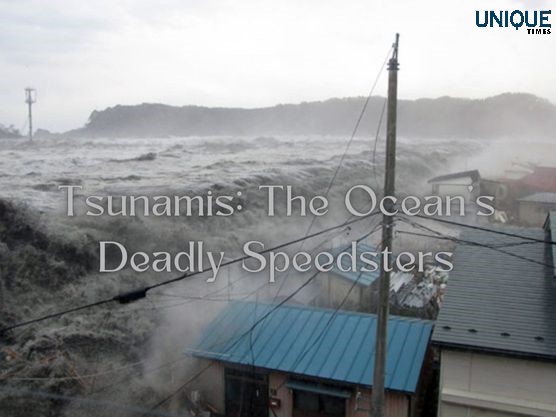Unleashing the Fury: The Power of Tsunamis Unveiled

Tsunamis, often referred to as “seismic sea waves,” are a natural force that has left a profound impact on coastal communities throughout history. These monstrous waves are not just fast-moving; they possess a deadly combination of speed and destructive potential. However, it’s essential to understand that a tsunami’s true hazard emerges when it approaches land. Let’s dive into the awe-inspiring world of tsunamis, where speeds exceed 500 mph, and the ocean’s fury comes crashing ashore.
The Lightning Speed of Tsunamis
Tsunamis are not your average ocean waves. They can travel at astonishing speeds, often exceeding 500 miles per hour (805 kilometers per hour) in deep water. This incredible velocity is a result of the immense energy released during underwater geological events like earthquakes, volcanic eruptions, or landslides.
The Calm Before the Storm
In the vast expanse of the open ocean, tsunamis are relatively unnoticed due to their long wavelengths and low amplitudes. These characteristics mean that, when traveling across deep water, tsunamis can pass by ships without causing any significant disturbance. It’s akin to a colossal underwater swell biding its time, waiting to reveal its true power.
The Hazardous Transformation Near Land
The real danger posed by tsunamis becomes apparent as they approach shallower waters near the coastline. Here’s how it unfolds:
- Decreasing Wavelength: In deeper waters, tsunamis have long wavelengths, which means the distance between wave crests is substantial. However, as they approach shallower coastal regions, these wavelengths decrease.
- Increasing Height: As the tsunami’s wavelength shortens, the energy it carries is concentrated into a smaller space. This leads to a significant increase in wave height.
- Intensified Currents: The narrowing of the wavefront also intensifies the currents associated with the tsunami. These powerful currents can inundate coastal areas, causing catastrophic flooding.
The Devastation Unleashed
When a tsunami finally crashes ashore, it can unleash a devastating wall of water, with wave heights ranging from a few feet to over a hundred feet (30 meters or more) in extreme cases. The combination of immense speed, towering waves, and powerful currents can wreak havoc on coastal communities, causing widespread destruction and loss of life.
Early Warning Systems
Given the catastrophic potential of tsunamis, many coastal regions have implemented early warning systems. These systems use seismic data and ocean sensors to detect underwater disturbances and issue timely alerts, providing crucial time for evacuation and preparation.
Conclusion
Tsunamis are a formidable force of nature, capable of traveling at incredible speeds and unleashing catastrophic destruction when they approach land. Understanding the science behind tsunamis and the hazards they pose is essential for coastal communities worldwide. While we may never fully control these awe-inspiring waves, early warning systems and preparedness can help mitigate their devastating impact and save lives when the ocean’s fury comes crashing ashore.
Picture Courtesy: Google/images are subject to copyright







